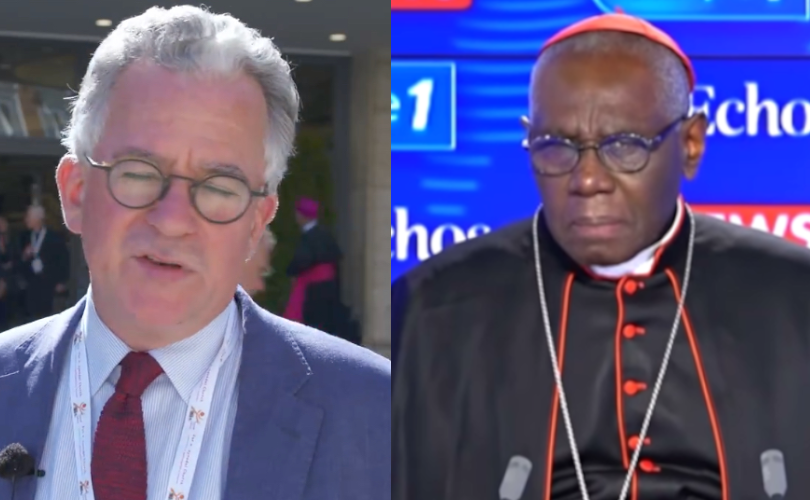(LifeSiteNews) — Papal biographer Austen Ivereigh called on Cardinal Robert Sarah to resign as cardinal for his condemnation of the controversial Vatican Declaration Fiducia Supplicans.
“Cdl Sarah has accused the Pope of heresy, violating the solemn oath before God he took as a cardinal,” Ivereigh wrote in a January 9 post on X, formerly Twitter.
“He must now hand back his red hat. If he is convinced in conscience, he must stay silent, trusting history & God to vindicate him. That is prophecy. All else is power politics,” Pope Francis’ biographer concluded.
Pro-LGBT Jesuit priest Fr. James Martin reposted Ivereigh’s call for Cardinal Sarah to resign, seemingly signaling agreement with the papal biographer’s assessment.
Sarah referred to the “blessings” of same-sex couples proposed by Fiducia Supplicans as “a heresy that seriously undermines the Church” in his written response to the Vatican document.
READ: Cardinal Sarah strongly rejects Fiducia Supplicans, ‘heresy’ of same-sex ‘blessings’
Writing in detail about the attempted distinction between forms of blessings, Sarah stated in full:
Allow me, therefore, not to fall into vain arguments about the meaning of the word blessing. It’s obvious that we can pray for the sinner, it’s obvious that we can ask God for his conversion. It’s obvious that we can bless the man who, little by little, turns to God to humbly ask for the grace of a true and radical change in his life. The Church’s prayer is not denied to anyone.
But it can never be diverted to become a legitimization of sin, of the structure of sin, or even of the impending occasion of sin. The contrite and penitent heart, even if still far from holiness, must be blessed.
But let’s remember that, in the face of unconverted and hardened hearts, no words of blessing come from the mouth of St. Paul, but rather this warning: ‘With your hardened heart, which does not want to be converted, you are storing up wrath against yourself for that day of wrath, when God’s righteous judgment will be revealed, He who will render to each according to his deeds’ (Rom 2:5-6).
Sarah stated that opposition to Fiducia Supplicans is not an opposition to Pope Francis, but instead is a move “firmly and radically opposing a heresy that seriously undermines the Church, the Body of Christ, because it is contrary to the Catholic faith and Tradition.”
St. Thomas Aquinas rebukes papal biographer
Catholic philosophy professor Edward Feser responded to Ivereigh, rebuking his claim that Sarah needed to resign for criticizing the heterodox document written by DDF (Dicastery for the Doctrine of the Faith) head Cardinal Victor Fernández.
If @austeni knew as much about Catholic theology as he does about hack advocacy journalism, he’d realize that a cardinal who suspects a pope of error has a duty to make this known, even publicly, as an act of assistance to the pope, as Aquinas taught: https://t.co/yDDi6sYwMN pic.twitter.com/OEaAuyt6cb
— Edward Feser (@FeserEdward) January 10, 2024
“If @austeni knew as much about Catholic theology as he does about hack advocacy journalism, he’d realize that a cardinal who suspects a pope of error has a duty to make this known, even publicly, as an act of assistance to the pope, as Aquinas taught,” Feser wrote.
In the article that Feser provided, he argued that a bishop has the right and duty to publicly correct the Pope under certain conditions, citing the Universal Doctor of the Church, St. Thomas Aquinas.
When Aquinas comments on the rebuke of the first pope, St. Peter, by the apostle St. Paul over Peter’s behavior towards non-Jewish Christians due to his fear of the Jewish Christians (cf. Galatians 2:11-21), he notes that “the manner of the rebuke was fitting, i.e., public and plain” because Peter’s “dissimulation posed a danger to all.”
In his Summa Theologiae (II-II.33.4), Aquinas notes that “[i]t must be observed, however, that if the faith were endangered, a subject ought to rebuke his prelate even publicly.”
“Hence Paul, who was Peter’s subject, rebuked him in public, on account of the imminent danger of scandal concerning faith, and, as the gloss of Augustine says on Galatians 2:11, ‘Peter gave an example to superiors, that if at any time they should happen to stray from the straight path, they should not disdain to be reproved by their subjects.’”
Feser furthermore pointed out that St. Paul’s rebuke of St. Peter “was not a matter of usurping Peter’s authority.”
“Aquinas says that ‘the Apostle opposed Peter in the exercise of authority, not in his authority of ruling’ (emphasis added). For Aquinas, it’s not that Peter did not have papal authority, but rather that in this instance his exercise of it amounted to an abuse. What Paul was doing was reminding Peter to do his duty. In this way, says Aquinas, Paul ‘benefitted’ Peter and ‘shows how he helped Peter by correcting him.’”
Feser also cited St. Francis de Sales, who confirmed that a pope can be corrected in certain situations:
Thus, we do not say that the Pope cannot err in his private opinions, as did John XXII, or be altogether a heretic, as perhaps Honorius was… When he errs in his private opinion he must be instructed, advised, convinced; as happened with John XXII… So everything the Pope says is not canon law or of legal obligation; he must mean to define and to lay down the law for the sheep, and he must keep the due order and form… And again we must not think that in everything and everywhere his judgment is infallible, but then only when he gives judgment on a matter of faith in questions necessary to the whole Church; for in particular cases which depend on human fact he can err, there is no doubt, though it is not for us to control him in these cases save with all reverence, submission, and discretion. (The Catholic Controversy, pp. 225-26)

